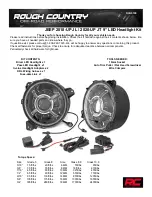
Driving safety systems
55
G
The Brake Assist System (BAS) operates in
emergency situations. If you apply the brakes
very quickly, the BAS automatically provides
full brake boost, thereby potentially reducing
the braking distance.
X
Apply continuous full braking pressure until
the emergency braking situation is over.
The ABS will prevent the wheels from
locking.
When you release the brake pedal, the brakes
function again as normal. The BAS is then
deactivated.
If the BAS malfunctions, the brake system
still functions, but without the additional
brake boost available that the BAS would
normally provide in an emergency braking
maneuver. Therefore, the braking distance
may increase.
G
The Electronic Stability Program (ESP
®
) is
operational as soon as the engine is running
and monitors the vehicle’s traction (force of
adhesive friction between the tires and the
road surface) and handling.
The ESP
®
recognizes when a wheel is
spinning or if the vehicle starts to skid. By
applying brakes to individual wheels and by
limiting the engine output, the ESP
®
works to
stabilize the vehicle. The ESP
®
is especially
useful while driving off and on wet or slippery
road surfaces. The ESP
®
also stabilizes the
vehicle during braking and steering
maneuvers.
The ABS/ESP
®
warning lamp
v
in the
instrument cluster comes on when you switch
on the ignition. It goes out when the engine
is running.
The ABS/ESP
®
warning lamp
v
in the
instrument cluster flashes when the ESP
®
is
engaged.
Never switch off the ESP
®
when you see the
ABS/ESP
®
warning lamp
v
flashing in
the instrument cluster. In this case proceed
as follows:
R
When driving off, apply as little throttle
as possible.
R
While driving, ease up on the accelerator
pedal.
R
Adapt your speed and driving style to the
prevailing road conditions.
Failure to observe these guidelines could
cause the vehicle to skid. The ESP
®
cannot
prevent accidents resulting from excessive
speed.
!
Because the ESP
®
operates
automatically, the engine and ignition must
be shut off (SmartKey in starter switch
position
0 or 1 or KEYLESS-GO start/stop
button in position
0 or 1) when the parking
brake is being tested on a brake test
dynamometer or when the vehicle is being
towed with the front axle raised.
Active braking action through the ESP
®
may otherwise seriously damage the brake
Safety and security
230_AKB; 1; 42, en-US
d2ureepe,
Version: 2.11.7.1
2008-11-27T15:37:19+01:00 - Seite 55
Z
















































